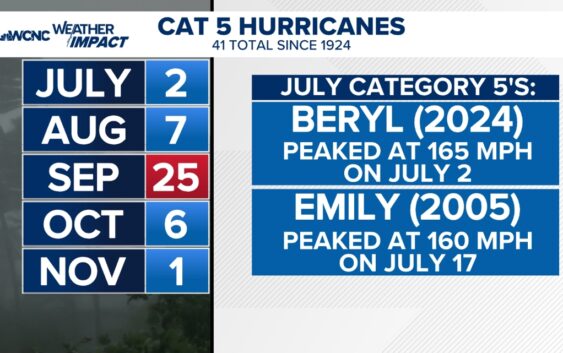- Seven months after Hurricane Helene, Chimney Rock rebuilds with resilience
- Wildfire in New Jersey Pine Barrens expected to grow before it’s contained, officials say
- Storm damage forces recovery efforts in Lancaster, Chester counties
- Evacuation orders lifted as fast-moving New Jersey wildfire burns
- Heartbreak for NC resident as wildfire reduces lifetime home to ashes
Beryl sets a new hurricane record

More severe storms typically form later in the season, but this hurricane has bucked the trend.
CHARLOTTE, N.C. — Beryl is officially the earliest Category 5 hurricane on record.
As the 3rd named storm of the 2024 hurricane season, Beryl continues to be a highly impactful hurricane, breaking records along the way.
The monstrous storm intensified into a Category 5 hurricane late Monday, just hours after it made landfall in the morning on Carriacou Island in the southeast Caribbean.
Category 5 hurricanes are more frequent later in the season instead of June, July, or August. Most Category 5 hurricanes occurred in September, and there have been 41 total such storms since 1924.
Beryl’s winds peaked at 165 miles per hour on July 2, 2024. This new record ranks Beryl as the earliest July category 5 hurricane. Hurricane Emily previously held the record with max sustained winds peaking at 160 on July 17, 2005.
Emily, Katrina, Rita, and Wilma are all notable Category 5 hurricanes from an active 2005 tropical season. Each of them left their impact for generations to come and this hurricane season is off to a similar start. The top hurricanes from that season caused thousands of people to lose their lives coupled with billions of dollars in damage.
With Beryl on track to impact summer travel hotspots like Jamaica and parts of the Yucatán Peninsula, continue to stay weather aware ahead of tropical weather.
On average, there are 14 named storms, seven hurricanes, and five major hurricanes in a season. For 2024, the National Hurricane Center projects 17 to 25 named storms, eight to 13 hurricanes, and three to seven major hurricanes.
Your WCNC Charlotte Weather Impact Team wants you to be prepared for an above-average hurricane season. These trends could be a sign of what’s to come this year in the tropics.
Contact KJ Jacobs at kjacobs3@wcnc.com and follow him on Facebook, X and Instagram.
WCNC Charlotte’s Weather IQ YouTube channel gives detailed explainers from the WCNC Weather Impact Team meteorologists to help you learn and understand weather, climate and science. Watch previous stories where you can raise your Weather IQ in the YouTube playlist below and subscribe to get updated when new videos are uploaded.